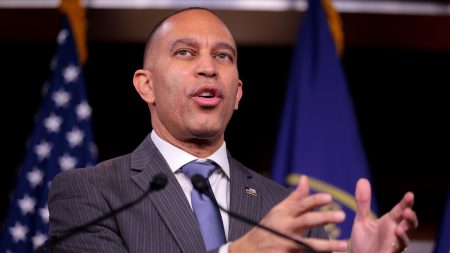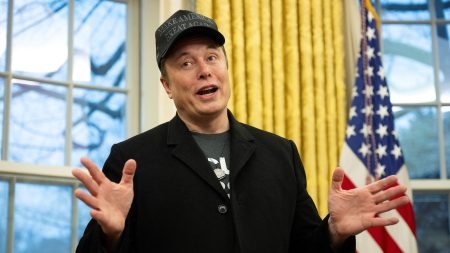Leadership Change at the Social Security Administration: A Clash Over Data Access
In a significant development at the Social Security Administration (SSA), Michelle King, a career official with over three decades of service, stepped down from her role as acting commissioner following a dispute with employees from the Department of Oversight and Governance Enforcement (DOGE) over access to sensitive personal records. King’s departure came after she was replaced by Leland Dudek, who took over as acting commissioner. The situation highlights tensions within the agency regarding data access and transparency, with sources indicating that DOGE employees sought entry to an internal data system containing extensive and sensitive information about Americans. This data includes earnings records, beneficiary details, marital statuses, and even medical records for those who have applied for disability benefits. While it remains unclear whether DOGE employees ultimately gained access to the system, the incident underscores the delicate balance between oversight and privacy in managing critical government records.
The Scope of Sensitive Data and Privacy Concerns
The data held by the Social Security Administration is expansive and deeply personal, making it a focal point of concern in disputes over access. According to Nancy Altman, president of Social Security Works, an organization advocating for the expansion of social security, the information maintained by the SSA includes not only financial records but also intimate details about individuals’ lives. "It’s your entire earnings record. If you’re a beneficiary, it’s your benefits, it’s the name of your spouse and when you got married and if you got divorced, and all kinds of information. And most sensitive, if you’ve applied for disability benefits, all of your medical records," Altman explained. This breadth of data makes the question of who should have access to it particularly contentious. While oversight is necessary to ensure the integrity of the system, the potential for misuse of such sensitive information raises significant privacy concerns. The clash between King and DOGE employees appears to have centered on these competing interests, with King reportedly resisting requests for broader access to the data.
New Leadership and Commitment to Transparency
In the wake of King’s departure, Leland Dudek assumed the role of acting commissioner, emphasizing his commitment to transparency and accountability. In an email sent to all SSA staff, Dudek expressed his pride in leading the agency, stating, "I will lead this agency in an open and transparent manner. My first call as Acting Commissioner was to our Inspector General’s office to provide them an opportunity to oversee and review any and all agency activities, including my actions past, present, and future. Transparency is at the heart of good government." Dudek’s message aimed to reassure employees of his dedication to ethical governance and openness, which may have been undermined by the controversy surrounding King’s exit. However, the transition also raises questions about the broader direction of the agency under interim leadership and the incoming administration’s priorities.
White House Perspective and Expectations
The White House has maintained a supportive stance regarding the leadership change, with Deputy Press Secretary Harrison Fields reiterating the administration’s confidence in Frank Bisignano, President Trump’s nominee for commissioner, who is expected to be confirmed by the Senate in the coming weeks. Fields emphasized the president’s commitment to appointing qualified individuals who prioritize the interests of the American people over bureaucratic inertia. "In the meantime, the agency will be led by a career Social Security anti-fraud expert as the acting commissioner. President Trump is committed to appointing the best and most qualified individuals who are dedicated to working on behalf of the American people, not to appease the bureaucracy that has failed them for far too long," Fields said. The statement frames the leadership transition as part of a broader effort to reform the agency and address inefficiencies, though critics may view it as an attempt to exert greater political control over the SSA.
The Role of DOGE and Objectives in Identifying Fraud
White House Press Secretary Karoline Leavitt shed further light on the involvement of DOGE employees, linking their activities to a broader initiative to identify and address fraud within the Social Security Administration. In an interview with Fox News, Leavitt explained that the primary goals of DOGE’s involvement were threefold: identifying and ending duplicate payments, stopping payments to deceased individuals, and protecting the integrity of the system for hardworking Americans who have contributed to it throughout their lives. Leavitt emphasized that individuals who have paid into the system honestly will continue to receive their Social Security checks, seeking to reassure beneficiaries amid the controversy. However, the methods and scope of DOGE’s activities remain unclear, and the role of outside entities, including figures like Elon Musk, has sparked curiosity and skepticism.
Implications and Uncertainty Moving Forward
The departure of Michelle King and the transition to new leadership under Leland Dudek mark a pivotal moment for the Social Security Administration, with significant implications for data privacy, transparency, and the fight against fraud. While the White House has framed the changes as a necessary step toward reform, critics are likely to scrutinize the involvement of DOGE and the administration’s broader priorities for the agency. The confirmed appointment of Frank Bisignano as commissioner will undoubtedly shape the future direction of the SSA, but for now, the agency finds itself navigating a challenging landscape marked by internal disputes, external oversight, and heightened public attention. As the situation continues to unfold, one thing is certain: the stakes are high, and the decisions made in the coming weeks and months will have lasting impacts on the millions of Americans who rely on the Social Security Administration.















